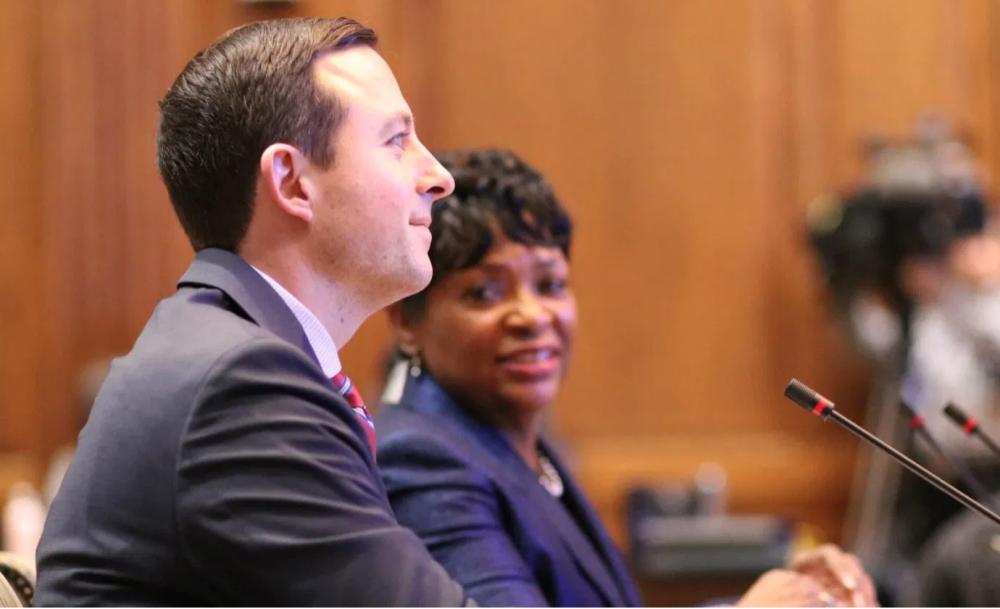After three years of policy-making and debate, an education reform plan that has been hailed by Democratic leaders as a once-in-a-generation opportunity to overhaul outdated education policies and correct inequities of the past will be sent to the governor’s desk.
“Good work, everyone,” said House Speaker Adrienne A. Jones (D-Baltimore County) after the bill passed on a vote of 96 to 38 Tuesday, prompting applause from lawmakers on the House floor.
Before the vote on the Blueprint for Maryland’s Future was taken, lawmakers took one last opportunity to implore their colleagues to vote in favor of the legislation.
Del. Stephanie Smith (D), chairwoman of the Baltimore City delegation, said it was the legislature’s obligation to give kids a better chance.
“This isn’t a crisis that just arose,” said Smith, “And we cannot say ‘Oh, we don’t have time to do right by you, just like we didn’t have time for your mother, we didn’t have time for your grandmother and no, we don’t have time for you.’”
“That is over,” said Smith, whose remarks were punctuated by cheers of support from colleagues. “That is unacceptable. And in my opinion, it’s un-American.”
House Majority Leader Eric G. Luedtke (D-Montgomery) said that the Blueprint reforms would touch students in every corner of the state.
“We are failing kids,” he said. “We’re not just failing kids today, we’ve been failing kids for decades.”
“I … represent the richest county in the state of Maryland, and in my county, too, we failed kids,” Luedtke said. “This bill provides the opportunity to change that, at long last after too many years. It provides the opportunity for the children of Maryland to get what they deserve.”
The Blueprint reforms would expand pre-kindergarten programs and career education for high schoolers, increase pay and career opportunities for teachers, and increase state funding for schools with high concentrations of poverty.
The bill heads to Republican Gov. Lawrence J. Hogan Jr.’s desk, where he can chose to sign the bill, veto it, or let it take effect without his signature.
If the bill is vetoed, lawmakers could override the governor in a special session tentatively planned for late May. The bill passed both chambers with a veto-proof majority.
Throughout the debate, Hogan and legislative Republicans have expressed concern about the plan’s price tag.
The ambitious plan is expected to increase state education funding by more than $2.8 billion annually in 2030.
According to analysts, state aid for education would top $10.2 billion in 2030, compared to about $7.2 billion in the Legislature’s 2021 budget plan.
And half of Maryland’s counties would be required to increase funding under the bill, with mandated annual increases climbing to a combined total of $600 million in 2030.
House Minority Leader Nicholaus R. Kipke (R-Anne Arundel) expressed concern that the reform bill doesn’t include specific funding for the reform. A package of tax bills to fund the first five years of the reform effort is moving forward separately in the chambers and could see final approval on Wednesday.
“If you really believe it is this great, and it is going to do these revolutionary things ― and I hope you’re right ― but if you really believe it, why don’t you pay for it?” Kipke asked.
The House overwhelmingly accepted amendments from the Senate, including provisions that failed in the House chamber earlier this month. But much has changed since then, including an urgency to pass the bill before the truncated session ends Wednesday afternoon and economic uncertainty fueled by the global COVID-19 pandemic.
Senate amendments included a cap on student-to-teacher ratios from Minority Leader J.B. Jennings (R-Harford), increased gubernatorial influence over an accountability board, and what was dubbed the “coronavirus amendment” from Senate Majority Leader Nancy J. King (D-Montgomery).
That provision would limit state and local education aid if the state’s revenue estimates drop by more than 7.5% in a given year.
Even so, Republican House lawmakers cited a potential financial downturn as a reason not to move forward with the bill this year.
House Appropriations Committee Chairwoman Maggie L. McIntosh (D-Baltimore City), who called King’s proposal “the coronavirus amendment,” said it provides for “exactly what most people want. And that is, if it is catastrophic, there is a stopgap.”
The final version of the bill also includes a provision that would require a “checkpoint” to test the success of the reforms by 2026.
Senate Education, Health and Environmental Affairs Chairman Paul G. Pinsky (D-Prince George’s), a staunch advocate for the reform plan, was honored in both chambers on Tuesday, even as he was absent.
The chairman worked late into the night on Monday, defending the bill and ushering its passage through the Senate chamber. His final words to the chamber on Monday night were a touching tribute to his wife, Joan Rothgeb, a retired educator who’d been battling cancer for the last year.
On Tuesday, Senate President Bill Ferguson (D-Baltimore City) shared the sad news with senators that Rothgeb died in the early morning hours. The chamber adjourned in her honor.
Passing the Blueprint bill was a top priority for Democrats this legislative session, particularly those in leadership positions.
Jones, McIntosh, Pinsky and Ferguson were at times members of the Commission on Innovation and Excellence in Education, which crafted the reform proposal.
The commission’s work was headed by William E. “Brit” Kirwan, chancellor emeritus of the University System of Maryland, who learned of the bill’s passage from afar, after the State House complex was closed to the public last week.
Originally, he had planned to be present in the State House when the final vote was taken.
“Generations of Marylanders will remember what you did here today,” Kirwan said in a statement Tuesday night. “Seeing the groundswell of support for this effort to lift up Maryland’s children has been one of the most rewarding experiences of my life.”
By Danielle E. Gaines and Hannah Gaskill


